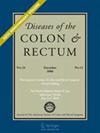Social Determinants of Health in Diverticulitis: A Systematic Review.
IF 3.2
2区 医学
Q2 GASTROENTEROLOGY & HEPATOLOGY
引用次数: 0
Abstract
BACKGROUND There is growing interest in social determinants of health for surgical populations. Within diverticulitis, no systematic collation of available evidence has been performed. OBJECTIVE To assess frequency, variety, and association directions for social determinants of health in colonic diverticular disease. DATA SOURCES Four electronic databases were queried: PubMed, Embase, Cochrane, and Web of Science. STUDY SELECTION Included studies reported symptomatic left-sided colonic diverticular disease with respect to a social determinant of health according to the Healthy People 2030 initiative or applicable proxy variable. Studies with non-English full text, cohort size fewer than 50, pediatric cohorts, and exclusively non-left sided disease were excluded. MAIN OUTCOME MEASURES Quality assessment through modified Newcastle-Ottawa scale, frequency of variables reported, and effect size trends for common comparisons. RESULTS Among 50 included studies, 40 were good and 10 were fair in quality. Social determinants of health in diverticulitis were identified across Economic Stability, Education Access and Quality, Health Care Access and Quality, Neighborhood and Built Environment, and Social and Community Context domains. The two most common variables were self-reported race and ethnicity (n = 33) and insurance (n = 22). Among 18 unique studies reporting comparisons of white versus any other self-reported race and ethnicity, twelve identified a disparity disadvantaging non-white groups with effect sizes (95% confidence interval ranging from 1.23 [1.10 -1.37] to 5.35 [1.32 - 21.61]). Among 15 unique studies reporting a non-private versus private insurance comparison, nine identified non-private insurance as a risk factor with effect sizes (95% confidence intervals ranging from 1.15 [1.02 - 1.29] to 3.83 [3.01 - 4.87]). LIMITATIONS Retrospective studies, heterogeneity across cohort and variable definitions. CONCLUSIONS Social determinants of health domains are associated with a variety of diverticulitis outcomes. Additional studies are needed to address infrequently reported domains and identify optimal strategies for intervening in clinical settings. PROSPERO ID CRD42023422606.憩室炎健康的社会决定因素:系统回顾
背景人们对外科人群健康的社会决定因素越来越感兴趣。目标评估结肠憩室疾病中健康的社会决定因素的频率、种类和关联方向。数据来源查询了四个电子数据库:PubMed、Embase、Cochrane 和 Web Science:研究筛选纳入的研究报告了有症状的左侧结肠憩室疾病与 "健康2030 "计划中的健康社会决定因素或适用的替代变量的关系。主要结果测量通过修改后的纽卡斯尔-渥太华量表进行质量评估,报告变量的频率,以及常见比较的效应大小趋势。结果在纳入的 50 项研究中,40 项研究质量良好,10 项研究质量一般。憩室炎健康的社会决定因素涉及经济稳定性、教育机会和质量、医疗保健机会和质量、邻里关系和建筑环境以及社会和社区背景等领域。最常见的两个变量是自我报告的种族和民族(33 人)以及保险(22 人)。在 18 项报告白人与任何其他自报种族和族裔比较的独特研究中,有 12 项研究确定了非白人群体的不利差距,其效应大小(95% 置信区间从 1.23 [1.10 -1.37] 到 5.35 [1.32 - 21.61])不等。在 15 项报告非私人保险与私人保险比较的独特研究中,有 9 项研究将非私人保险确定为风险因素,其效应大小(95% 置信区间从 1.15 [1.02 - 1.29] 到 3.83 [3.01 - 4.87]).局限性回顾性研究、不同队列和变量定义之间的异质性.结论健康的社会决定因素领域与各种憩室炎结果相关。需要进行更多的研究来解决不常报道的领域,并确定在临床环境中进行干预的最佳策略。
本文章由计算机程序翻译,如有差异,请以英文原文为准。
求助全文
约1分钟内获得全文
求助全文
来源期刊
CiteScore
4.50
自引率
7.70%
发文量
572
审稿时长
3-8 weeks
期刊介绍:
Diseases of the Colon & Rectum (DCR) is the official journal of the American Society of Colon and Rectal Surgeons (ASCRS) dedicated to advancing the knowledge of intestinal disorders by providing a forum for communication amongst their members. The journal features timely editorials, original contributions and technical notes.

 求助内容:
求助内容: 应助结果提醒方式:
应助结果提醒方式:


